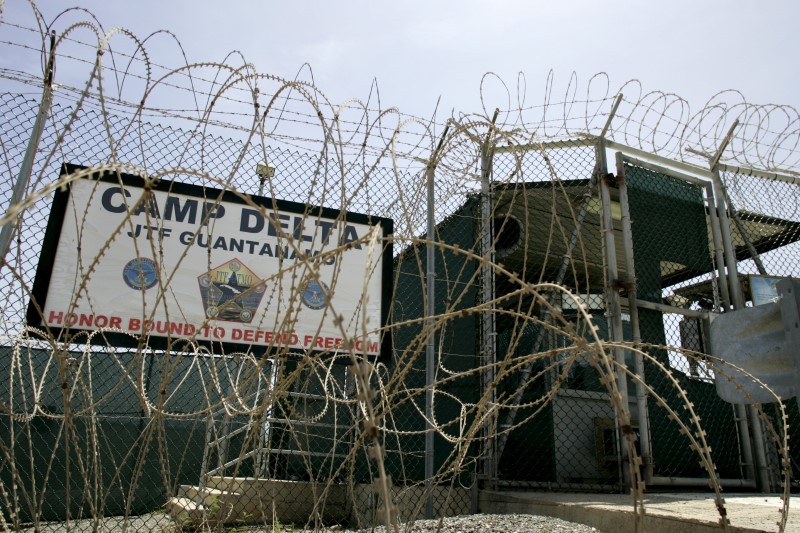By Jeff Mason and Ayesha Rascoe
WASHINGTON (Reuters) - President Barack Obama launched a final push on Tuesday to persuade Congress to close the U.S. military prison at Guantanamo Bay, Cuba, despite strong opposition from lawmakers who do not want detainees transferred to the United States.
The president, a Democrat, pressed the Republican-led legislature to give his proposal a "fair hearing" and said he did not want to pass the issue to his successor in January.
The Pentagon-authored plan proposes 13 potential sites on U.S. soil to hold some 30-60 detainees in maximum-security prisons but does not identify the facilities.
U.S. law bars transfers to the United States, and lawmakers are unlikely to lift those restrictions, especially in an election year.
“We’ll review President Obama’s plan," Republican Senate Majority Leader Mitch McConnell said. "But since it includes bringing dangerous terrorists to facilities in U.S. communities, he should know that the bipartisan will of Congress has already been expressed against that proposal.”
Paul Ryan, the Republican speaker of the House of Representatives, said Obama had yet to convince Americans that moving the prisoners to the United States was smart or safe.
Obama is considering taking executive action to close the facility, situated in a U.S. naval station in southeast Cuba, if Congress does not change its position. The White House declined to rule out a unilateral option on Tuesday.
Republicans oppose any executive order, and issuing one would almost certainly generate legal challenges.
The Guantanamo prisoners were rounded up overseas when the United States became embroiled in wars in Iraq and Afghanistan following the Sept. 11, 2001, attacks on New York and Washington. The facility came to symbolize aggressive detention practices that opened the United States to accusations of torture. Most detainees have been held without trial for more than a decade.
"Let us go ahead and close this chapter," Obama said at the White House. "I don’t want to pass this problem on to the next president, whoever it is. And if, as a nation, we don’t deal with this now, when will we deal with it?"
Obama pledged as a presidential candidate in 2008 to close Guantanamo. Doing so would fulfil that pledge and boost his legacy during his final year in office. Pressing his case now thrust the issue into the 2016 presidential campaign.
"Not only are we not going to close Guantanamo - when I am president, if we capture a terrorist alive, they are ... going to Guantanamo and we are going to find out everything they know," said Republican presidential candidate Marco Rubio.
HIGH COST
The plan would send detainees who have been cleared for transfer to their homelands or third countries and transfer remaining prisoners to U.S. soil to be held in maximum-security prisons. Congress has banned such transfers to the United States since 2011.
Though the Pentagon has previously noted some of the sites it surveyed for use as potential U.S. facilities, the administration wants to avoid fuelling any political outcry in important swing states before the Nov. 8 presidential election.
Republican Senator John McCain, Obama's 2008 presidential opponent and an advocate of closing the prison, scoffed at the plan as not being focused. "Thirteen different possible sites. That's a recommendation?" he said.
The White House has sought to buttress its argument for closing the prison by focusing on its high cost. Obama said nearly $450 million was spent last year alone to keep it running. The new plan would be cheaper, officials said.
The transfer and closure costs would be $290 million to $475 million, an administration official told reporters, while housing remaining detainees in the United States would be $65 million to $85 million less expensive than at the Cuba facility, meaning the transfer bill would be offset in 3 to 5 years.
The administration hopes sending the plan to Congress will spur lawmakers to help choose a facility they find amenable, but the White House is well aware the plan may not move at all.
"I am very clear-eyed about the hurdles to finally closing Guantanamo. The politics of this are tough," Obama said.
"Part of my message to the American people here is we’re already holding a bunch of really dangerous terrorists here in the United States ... and there have been no incidents. We’ve managed it just fine."
The Guantanamo facility, which Obama said once held nearly 800 people, now houses 91 detainees. Some 35 prisoners will be transferred to other countries in the coming months, bringing the final number below 60, officials said.
More prisoners could be transferred other countries as well, potentially lowering that number further. Obama said military commissions would continue to be used to try some of the prisoners, but he said that process also required reform.

Obama noted that his predecessor, Republican President George W. Bush, transferred hundreds of prisoners out of Guantanamo and wanted it closed.